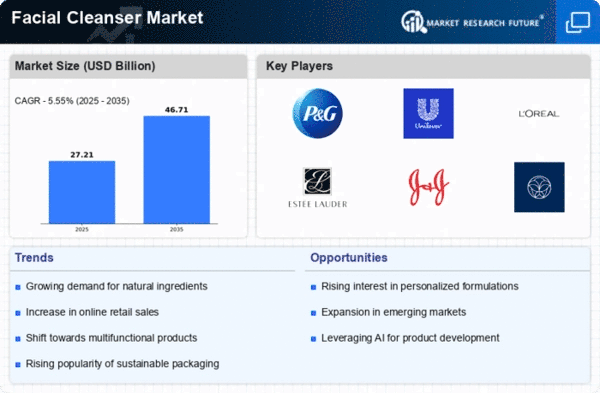Top Industry Leaders in the Facial Cleanser Market

The facial cleanser market, an integral segment within the beauty and personal care industry, is marked by a diverse range of products designed to address various skin types and concerns. As of 2023, key players in this market have strategically positioned themselves to cater to consumer preferences by offering an array of facial cleansers focusing on ingredients, formulations, and targeted skincare benefits.
Key Players:
L'Oréal (France)
Unilever (UK)
Procter & Gamble (US)
Johnson & Johnson (US)
Beiersdorf AG (Germany)
Estée Lauder Inc. (US)
Shiseido Co., Ltd (Japan)
Kao Corporation (Japan)
LVMH (France)
AVON COSMETICS (UK)
Strategies Adopted:
The facial cleanser market employ various strategies to maintain and enhance their market positions. Product diversification is a common approach, with brands offering cleansers for various skin types, including sensitive skin, acne-prone skin, and aging skin. Marketing strategies include collaborations with skincare professionals, influencers, and dermatologists to endorse products and enhance brand credibility. Pricing strategies vary, with some brands offering affordable options targeting mass consumers, while others position themselves as premium brands with higher-priced formulations. Distribution strategies involve both online and offline channels, ensuring accessibility to a broad consumer base. Additionally, continuous innovation in formulations, incorporating trending skincare ingredients, is crucial for staying competitive.
Market Share Analysis:
The facial cleanser industry involves considering several factors. Brand reputation and recognition play a crucial role, with consumers often trusting established brands for their skincare needs. The ability to offer a diverse range of cleansers addressing specific skincare concerns contributes to market share growth. Quality of formulations, including the use of effective and trending skincare ingredients, influences consumer satisfaction and loyalty. Pricing competitiveness, promotional activities, and product availability in various retail outlets impact market share dynamics. Positive customer reviews and endorsements from skincare professionals contribute to brand perception and influence market share.
News & Emerging Companies:
The facial cleanser market has seen the emergence of new companies focusing on clean formulations, sustainable practices, and unique ingredients. Emerging companies often leverage digital marketing and e-commerce platforms to establish their presence in a competitive market. News in this industry typically revolves around product launches, collaborations with influencers, and efforts to enhance sustainability through eco-friendly packaging and cruelty-free formulations.
Industry Trends:
The facial cleanser market often highlights trends in sustainable practices, technology integration, and the rising demand for clean beauty. Companies are increasingly investing in eco-friendly packaging, exploring biodegradable materials, and adopting cruelty-free practices to meet consumer demands for sustainable skincare options. Current investment trends reveal a focus on technology, with brands incorporating advanced skincare formulations and exploring digital solutions, such as virtual skincare consultations, to enhance the consumer experience. Additionally, investments in research and development aim to create cleansers with innovative ingredients that align with evolving skincare trends.
Competitive Scenario:
The facial cleanser market is characterized by a mix of established beauty conglomerates with a global presence and emerging clean beauty brands focusing on transparency and ethical practices. Established brands often leverage their extensive research and development capabilities, global marketing reach, and brand loyalty to provide consumers with a wide array of facial cleanser options. Emerging brands, on the other hand, focus on agility, sustainability, and ingredient transparency to appeal to the growing segment of consumers seeking clean and ethical beauty products.
The role of e-commerce has significantly impacted the competitive landscape, allowing both established and emerging brands to reach consumers directly and provide a platform for showcasing their facial cleanser offerings. Brands that effectively utilize digital marketing, optimize the online shopping experience, and engage with consumers through social media are better positioned to succeed in the evolving market.
Recent Development
The facial cleanser market witnessed a notable development as L'Oréal S.A. introduced a new range of facial cleansers under the CeraVe brand, formulated with advanced prebiotic ingredients. The inclusion of prebiotics aimed to promote a healthy skin microbiome and enhance the overall skin barrier function. This strategic move reflected L'Oréal's commitment to incorporating cutting-edge skincare innovations into its product offerings, addressing the rising consumer interest in microbiome-friendly skincare solutions.
Unilever made headlines by launching a sustainable initiative for its facial cleanser brands, including Dove and Simple, introducing refillable packaging options to reduce plastic waste. This environmentally conscious move showcased Unilever's dedication to addressing sustainability concerns and aligning with consumer preferences for eco-friendly beauty products. The initiative aimed to contribute to the brand's broader sustainability goals while responding to the growing demand for responsible packaging in the beauty industry











